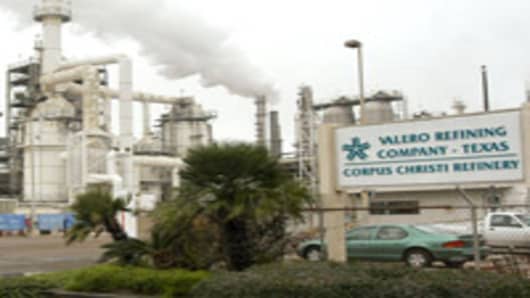As the summer doldrums set in for oil and equities, at least one sector has become a sleeper hit — refinery stocks.
Just look at Valero . Shares of the world’s largest independent refiner (by processing capacity) are surging over 5 percent topping $28 a share, after the company beat Wall Street consensus estimates by posting a boost in profits last quarter.
Valero reported a profit of $831 million, or $1.50 a share, for the second quarter of 2012, compared to $745 million, or $1.30 a share, a year earlier. Analysts on average had expected a profit of $1.43 a share, according to Thomson Reuters .
Shares of Valero, seen as an industry bellwether, have soared over 30 percent so far this year. But it is not the only refining stock posting big gains.
Shares of Western Refining have skyrocketed over 75 percent year-to-date, while Holly Frontier has surged 60 percent, Marathon Petroleum is up about 45 percent, and Sunoco has gained over 40 percent.
While U.S. oil prices are down 11 percent so far this year, U.S. refining stocks have been outperforming energy futures, the sector and the S&P 500 indexsignificantly. The S&P Oil & Gas Refining Index is up 36 percent this year, while the broader S&P 500 index is up only 10 percent.
“The U.S. refiners are benefiting by having the cheaper oil,” says Houston-based energy analyst Andy Lipow. “It all comes down to the raw material.”
Valero and other U.S. refiners continue to benefit from lower U.S. oil prices, relative to the benchmark, London-based Brent crude contract. The wide spread between the two benchmarks, with Brent crude currently trading at a nearly $17 a barrel premium to the West Texas Intermediate contract, represents the extra margin that U.S. refiners are generating – and they’re cashing in.
Meanwhile, refiners outside of the U.S., including Frances' Totaland Swiss-based Petroplus, Spain’s Repsol and Italy’s ENI, which primarily process Brent crude are at an immediate competitive disadvantage due to the higher price, analysts say.
Though retail demand for gasoline here in the U.S. remains weak, refined fuels are being processed at an attractive price for world markets, prompting the U.S. — which has historically been the largest importer of gasoline — to become the largest exporter for both gasoline and diesel.
As a result, analysts have been raising their expectations and price targets for U.S. refiners.
Wells Fargo initiated coverage of Valero with an “outperform rating” earlier in July, commending the company for its “highly complex refiners” that it says “will allow it to leverage its competitive position.”
Fadel Gheit, managing director and senior analyst of Oppenheimer & Co., said, “despite the strong stock performances of refining stocks this year, most stocks are trading at low multiples of earnings and cash flow.”
Gheit is expecting most U.S. refiners will have strong free cash flow next year which they will use create value for shareholders, in the form of cash dividends an share buybacks.
“The situation for U.S. refiners is not expected to change over the next 6-12 months,” agreed Lipow, president of Lipow Oil Associates. He expects mid-continent refiners to continue to benefit from cheaper oil from the region, while Gulf Coast refiners to continue exporting to the world markets.
Not only are U.S. refiners utilizing cheaper oil, Lipow noted, but they're also using cheaper natural gas to operate their units, rather than burning oil. With decade low natural gas prices, U.S.-based refiners appear to be benefiting from all sides.
-By CNBC's Sharon Epperson and Judy Gee
Follow Sharon on Twitter: @sharon_epperson



